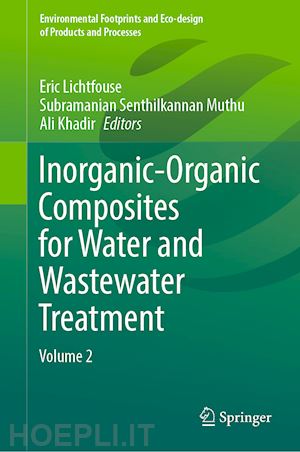

Questo prodotto usufruisce delle SPEDIZIONI GRATIS
selezionando l'opzione Corriere Veloce in fase di ordine.
Pagabile anche con Carta della cultura giovani e del merito, 18App Bonus Cultura e Carta del Docente
This second volume on ''Inorganic-Organic Composites for Water and Wastewater Treatment'' reviews research findings on advanced materials and methods for purification. Considering the fact that new emerging pollutants are released into the environment and water bodies, it is necessary to develop more advanced techniques in order to treat them. The utilization of metal – organic framework in view of applications, synthesis, properties like adsorption, characterization of the electronic and geometric aspects, and hybrid systems is reiewed in this book, and the advantages/disadvantages, shortcomings including future prospects associated with metal-based nanoparticles and nanocomposites for water decontamination are discussed. In addition, the use of carbon quantum dots, supramolecular ion-exchange resins, multifunctional composite aerogels, algal biomass valorization and titania-containing composites in treatment processes are also presented.
Eric Lichtfouse is a research scientist at Aix-Marseille University and an invited professor at Xi'an Jiaotong University. His research interests include climate change, carbon, pollution and organic compounds in air, water, soils and sediments. He his teaching biogeochemistry and scientific writing. He is chief editor of the journal Environmental Chemistry Letters, and the book series Sustainable Agriculture Reviews and Environmental Chemistry for a Sustainable World.
Subramanian Senthilkannan Muthu currently works for SgT Group as Head of Sustainability, and is based out of Hong Kong. He earned his PhD from The Hong Kong Polytechnic University, and is a renowned expert in the areas of Environmental Sustainability in Textiles & Clothing Supply Chain, Product Life Cycle Assessment (LCA) and Product Carbon Footprint Assessment (PCF) in various industrial sectors. He has five years of industrial experience in textile manufacturing, research and development and textile testing and over a decade's of experience in life cycle assessment (LCA), carbon and ecological footprints assessment of various consumer products. He has published more than 100 research publications, written numerous book chapters and authored/edited over 100 books in the areas of Carbon Footprint, Recycling, Environmental Assessment and Environmental Sustainability.
Ali Khadir is an environmental engineer and a member of the Young Researcher and Elite Club, Islamic Azad University of Shahre Rey Branch, Tehran, Iran. He has published several articles and book chapters in reputed international publishers, including Elsevier, Springer, Taylor & Francis and Wiley. His articles have been published in journals with IF greater than 4, including the Journal of Environmental Chemical Engineering, International Journal of Biological Macromolecules, and Journal of Water Process Engineering. He also has been the reviewer of journalsand international conferences. His research interests center on emerging pollutants, dyes and pharmaceuticals in aquatic media, advanced water and wastewater remediation techniques and technology.











Il sito utilizza cookie ed altri strumenti di tracciamento che raccolgono informazioni dal dispositivo dell’utente. Oltre ai cookie tecnici ed analitici aggregati, strettamente necessari per il funzionamento di questo sito web, previo consenso dell’utente possono essere installati cookie di profilazione e marketing e cookie dei social media. Cliccando su “Accetto tutti i cookie” saranno attivate tutte le categorie di cookie. Per accettare solo deterninate categorie di cookie, cliccare invece su “Impostazioni cookie”. Chiudendo il banner o continuando a navigare saranno installati solo cookie tecnici. Per maggiori dettagli, consultare la Cookie Policy.